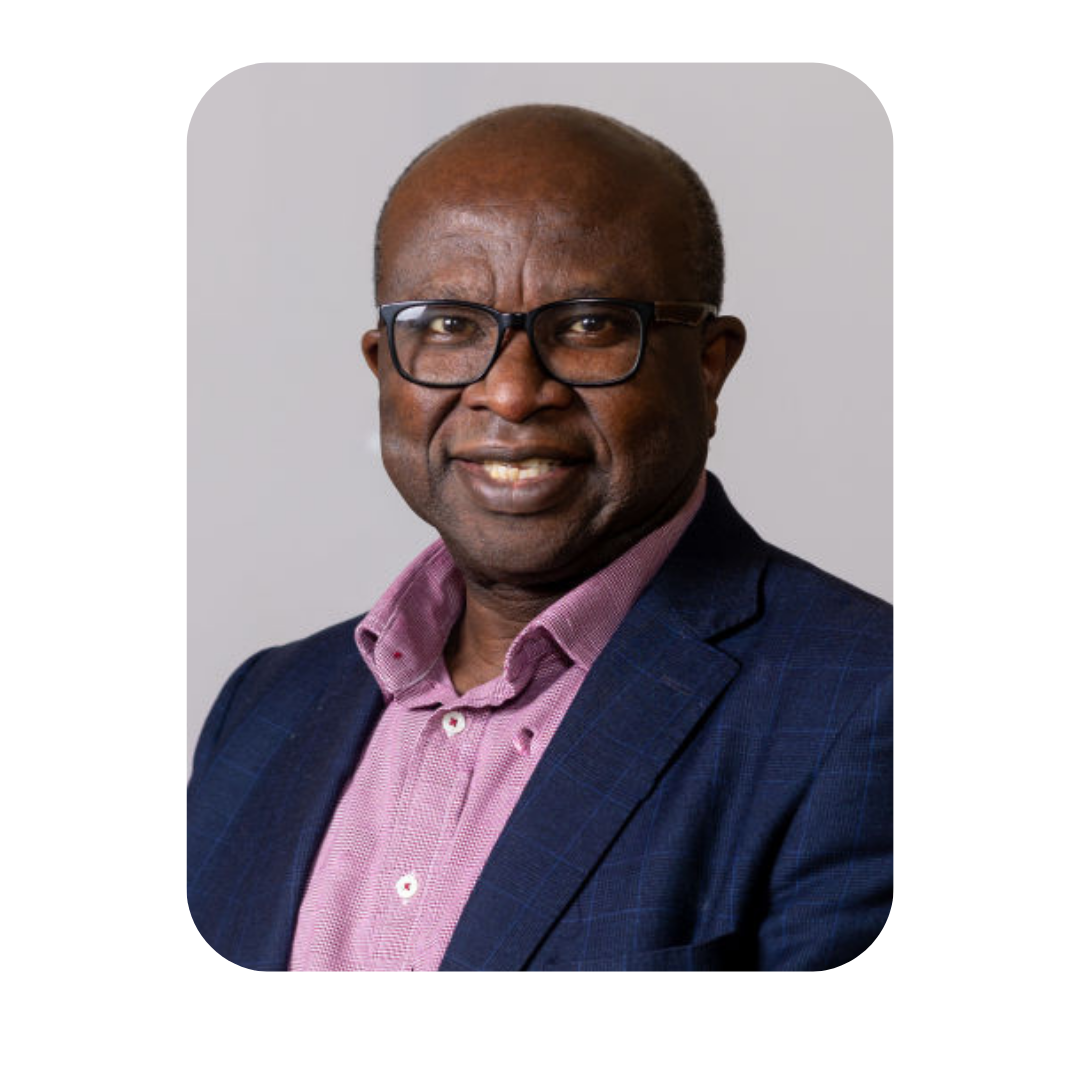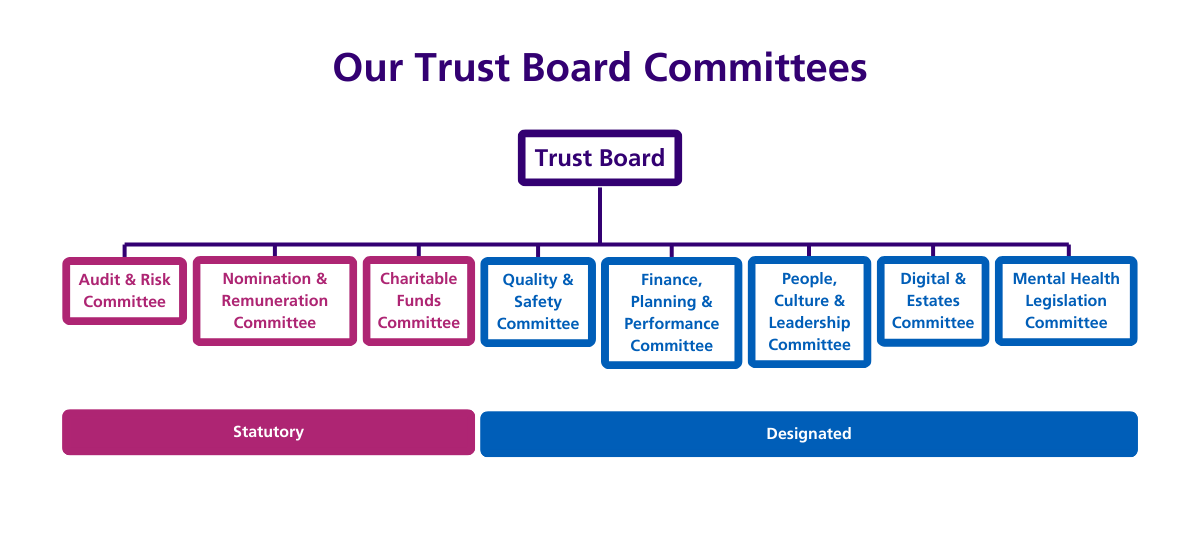The Board
Our Trust Board is responsible for the overall performance of the organisation and for setting the strategic direction
Our Trust Board is led by the Chair and Chief Executive and made up of Executive Directors and Non-Executive Directors. Our Non-Executive Directors are critical friends who add additional experience from a range of professional backgrounds.

Paul has over 41 years’ NHS experience and over 30 years’ experience on a wide variety of NHS Boards, in a career that has included being a Director of Finance and a Chief Executive in both Wales and England.
Paul has been a Non-Executive on the Bath and North East Somerset, Swindon and Wiltshire (Integrated Care Board (ICB) since 2022 and before that he was a Non-Executive at Salisbury NHS Foundation Trust since 2018.During his career Paul also has considerable experience of working in large Mental Health providers in Wales and England and through this has gained an understanding of the vital importance of service user and staff engagement in helping to provide consistent high quality services.
In addition to his work, Paul is passionate about Welsh rugby and Reading football club, loves to travel, cook and tries to keep fit.

Dominic started his role at AWP in August 2019, having previously worked as Chief Operating Officer and Deputy Chief Executive at Oxford Health NHS Foundation Trust.
With an MBA from Harvard Business School, Dominic has over 20 years’ leadership experience, leading teams to transform services across acute, community, mental health and children's/young people's pathways. Dominic has led responses to CQC inspections and formation of partnerships across primary, acute, community and social care.
Since joining AWP, Dominic has been motivated by his commitment to support teams in delivering outstanding care for service users and their families, friends and carers. To achieve his vision of ‘Outstanding AWP’, Dominic has focused teams across the Trust on delivering high quality care, developing outstanding people, providing sustainable services and delivering care in partnership.
For Dominic, one the best parts of his role as Chief Executive of AWP is to celebrate positive practice across the team, and he actively seeks to identify achievements that team members across the Trust are proud of.
Dominic is responsible for how the organisation is managed and for the achievement of all objectives. He is held to account by the Trust Board but in turn holds Executive Directors to account for those responsibilities they have delegated through management structures.

Alison joined AWP in March 2022 from NHS Hampshire, Southampton and Isle of Wight Clinical Commissioning Group (CCG), where she was the Managing Director for the Isle of Wight as well as programme lead for Children’s Services, Maternity, and Learning Disabilities and Autism across the Integrated Care System (ICS).
Alison is responsible for the following areas:
- To deputise for the Chief Executive across all areas of responsibility.
- To lead on Integrated Care System (ICS) management.
- To be the AWP Executive lead for the Bath, Swindon and Wiltshire (BSW) Integrated Care System ICS.
- To lead and support the Company Secretary to deliver corporate objectives to achieve an ‘outstanding’ rating by CQC.
- Ensuring AWP services are sustainable into the future.
- Communications and Engagement.

Janet has worked in the NHS for the last 40 years. Holding executive and sub-board positions since 2001, she has worked locally as a Chief Nurse/Director of Nursing and Quality in Hospitals, Clinical Commissioning Groups and Primary Care Trusts – regionally as the Director of Nursing across Thames Valley Strategic Health Authority, and nationally at the Department of Health as the Clinical Advisor in the development of NHS Professionals.
Passionate about patient and service user outcomes and experiences, Janet previously held trustee positions for the Terence Higgins Trust and the National Sickle Cell Society.
Janet was appointed to the Board in May 2020.

Ela comes to AWP having completed a career in the NHS spanning over 30 years. She has worked at local and national level, most recently as the Director for Mental Health and Care Services in the London boroughs of Kensington & Chelsea and Westminster. Ela runs her own company; CommotionUK specialising in social entrepreneurial and change projects. Clients include the American Institutes for Research, New York Medical Academy, Kent & Medway NHS & Social Care partnership Trust, the National Trust and NICE.
Her work both in and outside the NHS is about recognising and celebrating difference but also challenging systems to improve by bringing issues of diversity and social inclusion into the centre of shaping what and how services are delivered.
Ela is a Lay member on the Clinical Ethics Committee for Central and North West London (CNWL) NHS Foundation Trust and is a Trustee of the Hawkwood Centre for Future Thinking in Gloucestershire.

Julian joined AWP in July 2017 with a background in people leadership across a range of sectors. During his preceding 10 years with the Environment Agency, Julian fulfilled key roles in the senior human resources team, pursuing his passions of staff engagement and the development of effective and motivational line managers.
Throughout his career, Julian has remained focused on bringing his expertise to organisations that provide services people really need. This interest led him to become Director for People at AWP, an organisation he describes as incredibly meaningful and inspiring.
Julian is responsible for the following areas:
- Organisational development, Executive development, leadership
- Employee relations case work
- Payroll
- Equality, Diversity and Inclusion
- Staff experience and wellbeing
- Recruitment
- Learning and development

Brian has extensive experience in acute and primary care, holding a position for nine years as Chairman of the Royal United Hospitals NHS Foundation Trust (RUH), in Bath. Prior to his appointment at the RUH, he was a Foundation Trust Network Board Member and Trustee, and has previously worked for NHS Wiltshire as Non-Executive Director and Vice Chairman.
Brian has a Master’s degree in Business Administration and is a Fellow of the Chartered Institute of Management Accountants (FCMA), having an extensive career in the global automotive component industry.
Brian now tutors as an Associate Lecturer on the Open University Chartered Manager Degree Apprenticeship programme, tutors with the Healthcare Financial Management Association on postgraduate programmes and is a Trustee of Wiltshire Mind.
Brian was appointed to the board in April 2019.

Paul was appoinited as a Non-Executive Director in December having retired from a broad-ranging 37-year career with Lloyds Bank. Paul has extensive general management experience developed across roles in marketing, sales, customer service and strategy across the bank’s retail, insurance and commercial banking divisions.
During the final 10 years of his career, Paul held the dual position of CEO of AMC PLC - the largest lender to the agricultural sector in the UK - and Regional Managing Director for SME Banking, leading a large and geographically dispersed team across the UK.
Paul has personal experience of severe mental ill health, and this underpins his strong desire to support the trust, make a difference, and help to improve the care of those who are suffering from poor mental health today.

Simon joined AWP in September 2016 from Wiltshire CCG where he worked as the Chief Financial Officer and Deputy Accountable Officer.
Simon has spent the whole of his career in the NHS and has worked in a range of organisations including ambulance trusts, integrated health and social care providers, and commissioning organisations. He is passionate about the NHS and particularly supports the empowerment of his teams to deliver the best they can to transform the services that they support.
Simon is responsible for the following areas:
- Financial accounting
- Contracting of services
- Procurement of goods and services
- IT
- Estates strategy
- Health and Safety (interim)
- Risk Management (interim)
- Financial governance
- Information governance
Simon has recently joined the Royal United Hospitals Bath NHS Foundation Trust on secondment as their interim Director of Finance.

Sarah joined AWP in April 2019. She became a Consultant Psychiatrist in 2001, specialising in older adults having also accredited in general adult psychiatry. Sarah then fulfilled lead roles for the Mental Health Act, electroconvulsive therapy (ECT) and appraisal/revalidation before moving into formal leadership roles. She has achieved a MSc in Healthcare Leadership and the Elizabeth Garrett Anderson NHS Leadership Academy qualification. Sarah is also trained in lean quality improvement (QI) methodology.
Before her move to AWP, Sarah worked as a Clinical Director and Deputy Medical Director for a large mental health/community physical health trust. She is an expert in mental capacity assessments, the application of the Mental Capacity Act, and is a special visitor with the Court of Protection.
Sarah is responsible for the following areas:
- Professional management of medics and Responsible Officer
- Medical Education
- Research and Development
- Caldicott Guardian
- Pharmacy
- Mental Health Legislation
- Strategy and Transformation
- Business Development
- Business Intelligence

Paul is a Professor of Construction Engineering, with over 200 publications to his credit and currently the Pro Vice-Chancellor for Environment and Technology at University of the West of England in Bristol. Paul is passionate about world-class education and cross-functional collaborations. He is a Fellow of the Royal Society of Arts and Manufacturing, a gifted creative thinker, strategic policy developer, and is renowned among his colleagues and team members as an inspirational leader.
Paul was appointed to the Board in April 2020.

Emma is a co-founder of an employment branding agency, a Fellow of the Royal Institution of Chartered Surveyors, and an abstract artist in Bath. Before launching her design career, Emma led multi-billion-pound workplace design and cultural transformation programmes in the public and private sectors. Her work includes establishing the UK code of practice for smart working at the Cabinet Office and leading on all matters relating to the forward programme of government construction. Emma was also responsible for designing and developing the plan for a relocation of Parliament during the future multi-year refurbishment programme of the Palace of Westminster.
Emma joined AWP as an Associate Non-Executive Director in January 2023 and has lived experience of mental health.

Sarah was appointed to role of Director of Nursing and Quality in May 2023 but has a long and loyal history in AWP having started her career in the organisation in 1998 as a Health Care Support Worker. Sarah is a passionate Nurse who focused her clinical work in Adult Acute Psychiatric Inpatient settings, specialising in psychosocial interventions for psychosis and practising in cognitive behaviour therapy and family interventions. Sarah has worked in a wide range of roles throughout the organisation most recently as Clinical Director for Specialised Secure and CAMHS Division and as Deputy Director of Nursing.
Sarah is responsible for the following areas:
- Patient safety
- Professional management of all clinical and non-clinical professionals
- CQC registration, compliance and inspection
- Freedom to Speak Up
- Infection, Prevention and Control
- Safeguarding
- Patient Advice and Liaison Service (PALS) and complaints
- Suicide prevention
- Service user and carer involvement
- Physical health

Pete joined AWP in February 2017 from Wiltshire CCG as Deputy Director of Finance. He is currently covering as Interim Director of Finance.
Pete started his career in local government, supporting social care from a financial perspective for 12 years before joining the NHS in 2013. Pete has worked in both commissioning and provider organisations and is committed to supporting the delivery of high quality sustainable public services.

Mathew is a qualified mental health nurse who joined AWP in 2014 as Deputy Director of Operations before he became Chief Operating Officer in July 2018. Before joining AWP, Mathew specialised in Psychiatric Intensive Care Unit (PICU) and acute care and set up and ran the Montpellier Secure Recovery Service in Gloucester for seven years.
Mathew was instrumental in securing the contract for Child and Adolescent Mental Health Services (CAMHS) in Gloucestershire before leading the transformation and expansion of the service, helping to develop several system-wide solutions for vulnerable children and their families. These include the Family Drug and Alcohol Court and a Functional Family Therapy Team. Mathew also developed the National Minimum Standards for CAMHS PICU.
Mathew is responsible for the following areas:
- Operations service delivery
- Facilities management and transport
- Programme Management Office
- Temporary staffing
- Emergency Planning, Responsiveness and Resilience (EPRR)

Prior to joining the Trust, Paul was Director of Finance, Planning & Performance with the Crown Commercial Service, a government agency of the Cabinet Office. He has also served in other government agencies, including the Driver and Vehicle Standards Agency and Companies House. A lifelong public finance professional, Paul's career started in local government and he has worked in Councils’ covering South West England and South Wales. He also serves as an external member of the Bristol Zoological Society’s Finance, Risk and Audit Committee.

Recognised as Top 50 Business & Marketing Visionary in Web3 and new technology with vast experience in local government and Web3 innovations. With over three decades of leadership in children and adult services, and as a CEO in a unitary authority, Alison has introduced Virtual Reality for public service training and developed transformative AI tools like "GPT GovWeb3AI" and "Fairhire AI." Founder of Metacampus, she's committed to improving digital competencies across professions. Alison aims to apply her extensive public sector and technological expertise to enhance mental health care, driven by her dedication to societal improvement and community well-being.
The Board exercises some of its functions through seven Board committees, three of which are statutory committees. Board committees provide an opportunity for more in-depth scrutiny than is possible during Board meetings. Each is chaired by a non-executive director and other directors make up their membership.

You can find further details of each Board committee below:
The Audit and Risk Committee is responsible for providing the Board with a means of independent and objective review of the financial and corporate governance, assurance processes and risk management across the whole of the organisation’s clinical activities.
The Nomination and Remuneration Committee fulfils the role of the Nominations Committee (for Executive Directors) and of the Remuneration Committee. The Committee approves the appointment of the Chief Executive Officer and makes decisions about Executive Director remuneration.
The Charitable Funds Committee is responsible for monitoring the income and expenditure of charitable donations and for considering how charitable funds are invested. The Board is the corporate trustee of the charitable funds and the Committee oversees the charity’s operation on behalf of the corporate trustee.
The Quality and Safety Committee has responsibility for ensuring that appropriate arrangements are in place for measuring and monitoring quality, including patient safety and monitoring service user experience. The Committee provides assurance to the Board that these arrangements are robust and effective.
The Finance, Planning and Performance Committee has responsibility to provide the Board with independent and objective oversight and assurance on the Trust's financial, performance and business development arrangements and has oversight of the planning process.
The People, Culture and Leadership Committee has responsibility to provide assurance to the Board that the Trust has in place the necessary structures and processes for the effective provision of People, Culture and Leadership and complies with all legislation, regulations and guidance relevant to the Trust.
The Digital and Estates Committee has responsibility to provide assurance to the Board that the Trust’s digital and estates arrangements are sufficiently and effectively managed and controlled.
The Mental Health Legislation Committee is responsible for providing assurance to the Trust Board on compliance with relevant mental health legislation.








